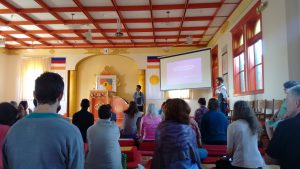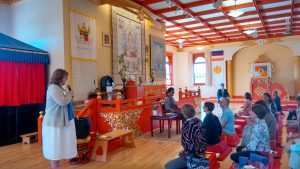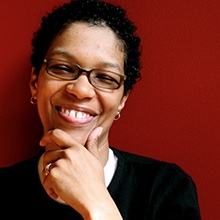Sunday
Community ArticlesExploring Social Cocoon
A special weekend program in Boulder, Colorado with Reverend angel Kyodo williams
by Melanie Klein
 The Boulder Shambhala Center had the great fortune to host a weekend program titled Disrupting Patterns and Embodying Wholeness with Rev. angel Kyodo williams, Sensei in early June. Originally anticipated – by me, anyway – to be a secular event intended to promote sangha interest in diversity, it was instead non-stop, potent, transformative dharma.
The Boulder Shambhala Center had the great fortune to host a weekend program titled Disrupting Patterns and Embodying Wholeness with Rev. angel Kyodo williams, Sensei in early June. Originally anticipated – by me, anyway – to be a secular event intended to promote sangha interest in diversity, it was instead non-stop, potent, transformative dharma.
I noticed some months back that when I mentioned the word “diversity” to fellow Shambhalians along with my interest in planning a series of events on the subject, often a strange, blank expression came over their faces. I quickly learned that for some diversity was equated with shaming: shaming white folks into reflecting on privilege, into feeling the pain of living in a society where corruption and racism permeate the culture visibly and invisibly, into confronting a sense of powerlessness and a desire to maintain what is familiar. A number of people said to me, “Oh, thanks, I’ve already done Shambhala diversity training.”
This resistance to diversity, I’ve learned, is not uncommon throughout the mandala’s largely white community (perhaps especially in the U.S.), as is resistance generally to the painful topic of race and social injustice – just as with anything painful. So how do we encourage the bravery necessary for us to move beyond social conditioning and division, to recover a sense of social wholeness and become the truly, broadly welcoming community we long to be?
 Rev. angel, the second African American to be fully authorized as a teacher in the Soto Zen tradition, and a frequent presenter at Shambhala events with the Sakyong (including at Awaken Chicago last month), fully acknowledged our pain and resistance at the outset of the two-day program. She had us begin by learning an embodying multi-step practice (known as Centering Practice, based on exercises developed by Wendy Palmer) designed to remind us of our strength (the body’s rootedness in integrity); our dignity (the body extending skyward); our connection to the world (the body’s exterior and reach); and “what matters most” (held in the belly and left to each of us to name). Once we were familiar with this practice, Rev. angel and her teaching companion, Śvani Grevemeyer, introduced subtle physical pressures to trigger habitual responses. Then while under pressure we practiced again, contacting our strength, dignity, connection, and wholesome view. It was only after we gained some familiarity with this that Rev. angel introduced a difficult conversation about racism, corruption, and privilege (systems that sustain unequal opportunity) in America. During the two hour presentation and discussion, the Boulder shrine room felt hushed with sorrow yet attentive as we fifty participants sat with things as they are and have been, felt our place in their midst, periodically returning to the embodiment of strength, dignity, connection, and view.
Rev. angel, the second African American to be fully authorized as a teacher in the Soto Zen tradition, and a frequent presenter at Shambhala events with the Sakyong (including at Awaken Chicago last month), fully acknowledged our pain and resistance at the outset of the two-day program. She had us begin by learning an embodying multi-step practice (known as Centering Practice, based on exercises developed by Wendy Palmer) designed to remind us of our strength (the body’s rootedness in integrity); our dignity (the body extending skyward); our connection to the world (the body’s exterior and reach); and “what matters most” (held in the belly and left to each of us to name). Once we were familiar with this practice, Rev. angel and her teaching companion, Śvani Grevemeyer, introduced subtle physical pressures to trigger habitual responses. Then while under pressure we practiced again, contacting our strength, dignity, connection, and wholesome view. It was only after we gained some familiarity with this that Rev. angel introduced a difficult conversation about racism, corruption, and privilege (systems that sustain unequal opportunity) in America. During the two hour presentation and discussion, the Boulder shrine room felt hushed with sorrow yet attentive as we fifty participants sat with things as they are and have been, felt our place in their midst, periodically returning to the embodiment of strength, dignity, connection, and view.
It strikes me now that the problem with “diversity” may be that it’s too theoretical a term. It points toward, but does not penetrate, a longing for social cohesion. As Rev. angel so ably demonstrated, it is only when we can – through supportive, skillful means – engage the fear that drives us to separate into tribes or clans of belonging (by class, race, ethnicity, language, religious tradition, or political persuasion…) and maintain them at the expense of others, that shifting toward something braver is possible.
At the program’s close, and just before everyone was invited to share a personal “mantra” about who we will be in the world five years from now, we were reminded by the Shambhala teachers who were present that the work of unwrapping social cocoon and pacifying tribalism is precisely the work of creating enlightened society. As a center director inspired by Awaken Chicago and our own nascent efforts in Boulder to enter into dialogue with Native American neighbors, I feel Shambhala moving toward engagement with the local and global dynamics of domination, privilege, and appropriation (societal expressions of aggression, denial, and craving). How then do we skillfully and widely offer the insights of our precious Shambhala teachings – perhaps especially those about creating accommodating, wakeful spaces – along with other worthy approaches to foster a society that dares to be curious, undefended, and magnanimous?
Melanie Klein is the Executive Director of Shambhala Boulder


















Jun 26, 2016
Reply
Thanks, well said. Here in Birmingham, the pull of karmic patterns over generations can be so palpable, but they are also known, and that may help us slip out of their power.
Jun 20, 2016
Reply
Thank you for sharing some experiences of this weekend in Boulder for the many of us in other cities who would have genuinely liked to have been present for these teachings.
I am especially sitting with the statement: “It is only when we can – through supportive, skillful means – engage the fear that drives us to separate into tribes or clans of belonging (by class, race, ethnicity, language, religious tradition, or political persuasion…) [insert other flavors of suffering] and maintain them at the expense of others, that shifting toward something braver is possible…”
In particular this phrase “and maintain them at the expense of others” seems to stand out to me. If one really begins to understand what it means to “maintain [tribes of separation]” … essentially families, communities, neighborhoods, populations … “at the EXPENSE of others” – then perhaps one has begun to also recognize that accepting our basic humanity also requires accepting the most fearful, aggressive, primitive or unsavory aspects of ourselves as necessary manifestations of wisdom driven by our basic goodness. Knowing our own tribe or our own voice goes a long way, yes, but why would we not begin to wear out these expenses at the same time? I suppose I am pointing to something like “clan ego” and asking how it will wear itself out?
By being present to and with fear, this basic fear, a collectively embodied fear, might we not become inspired to engage what goes beyond the story of separation, even amidst the reality of fear, aggression, arrogance, ignorance? Not to deny the power of owning various levels of orientation and basic tribe-making – but somehow I see bravery less in the maintaining and more so in the shifting: cannot tribal circles be concentric in some fashion and perhaps infinitely expansive? So that whether and where we choose to maintain expenses if any at all should really matter.
Jun 20, 2016
Reply
Thanks Melanie, this is really rubber-meets-the-road fearlessness practice
Jun 20, 2016
Reply
Diversity is a complex issue. Unlike tolerance or respect for difference, diversity implies that variety is *necessary*, that there’s a basic problem with not being part of a multi-cultural, multi-racial, milieu. It celebrates difference superficially, but that very celebration is an attempt to neutralize difference. There are a number of hidden issues in that view. One is a uniquely American inferiority attitude. We have little cultural history so we’re quick to adopt perceived cultural richness from others. Another issue is a well intentioned rationalism. We want to be reasonable and tolerant. But culture is not merely variety, like eye color. Culture is an experiential mandala. The only position from which to appreciate all cultures equally is a kind of armchair, cultureless, Unitarian neutrality: Intellectual appreciation for cultures in which we don’t actually have to take part.
A third and perhaps more basic issue is fundamental consumerism, so basic and pervasive as to be unconscious. In the culture of consumerism, happiness and personal fulfillment are the only true values, while the only true ethic is not to interfere with other peoples’ consumerism. As consumers of experience, we have a right to choose. As members of consumer society, we support everyone else’s right to choose. In that spirit we want to be inclusive. But we don’t want to have to actually live within any culture. We convert those to postmodern collectibles in consumer culture.
It’s important to recognize that there’s a cultural container for diversity. It can’t happen in a vacuum with no reference points. And that container is actually consumer society. How else can we “long for social cohesion” while promoting multiculturalism? Those are conflicting goals. It’s only from the view of consumerism that we can pretend otherwise.
All of which is to say that while practicing kindness and tolerance are important, there is no conflict between that and being a good citizen in one’s own culture. To the contrary: Without distinctions, without “tribes” and without growing up in a coherent society, people are unlikely to develop confidence to tolerate foreign cultures. The celebration of so-called diversity has led us to a splintered society in which we can no longer agree even on basic issues like how to raise children or what constitutes education.